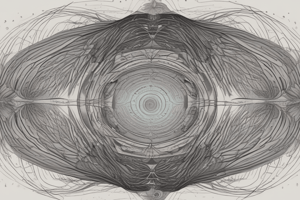Podcast
Questions and Answers
Cognitive Psychology is the study of mental processes, including perception, attention, and motivation.
Cognitive Psychology is the study of mental processes, including perception, attention, and motivation.
False (B)
The cognitive architecture ACT-R is a theoretical framework that describes the structure and function of the brain.
The cognitive architecture ACT-R is a theoretical framework that describes the structure and function of the brain.
True (A)
The stage of information processing that involves taking in sensory information is called encoding.
The stage of information processing that involves taking in sensory information is called encoding.
False (B)
Schemas are mental frameworks that help us organize and make sense of information.
Schemas are mental frameworks that help us organize and make sense of information.
Heuristics are mental shortcuts that help us make decisions and solve problems, but they always lead to optimal solutions.
Heuristics are mental shortcuts that help us make decisions and solve problems, but they always lead to optimal solutions.
Divided attention is the ability to focus on multiple stimuli simultaneously.
Divided attention is the ability to focus on multiple stimuli simultaneously.
Long-term memory is the ability to store information for a short period of time.
Long-term memory is the ability to store information for a short period of time.
Neuroimaging techniques, such as fMRI, are used to measure brain activity in cognitive psychology research.
Neuroimaging techniques, such as fMRI, are used to measure brain activity in cognitive psychology research.
Flashcards are hidden until you start studying
Study Notes
Cognitive Psychology
Definition and Scope
- Study of mental processes, including perception, attention, memory, language, problem-solving, and decision-making
- Focuses on how we process, store, and retrieve information
Key Concepts
- Cognitive Architectures: Theoretical frameworks that describe the structure and function of the mind
- Examples: ACT-R, SOAR, and Connectionism
- Information Processing: The process of taking in, storing, and retrieving information
- Stages: sensation, perception, attention, encoding, storage, and retrieval
- Schemas: Mental frameworks that help us organize and make sense of information
- Heuristics: Mental shortcuts that help us make decisions and solve problems
Cognitive Processes
- Attention: The ability to selectively focus on certain stimuli or tasks
- Types: selective, divided, and sustained attention
- Memory: The ability to store and retrieve information
- Types: sensory, short-term, and long-term memory
- Language: The ability to understand and communicate through verbal and non-verbal symbols
- Components: phonology, syntax, semantics, and pragmatics
- Problem-Solving: The ability to identify and solve problems
- Strategies: algorithmic, heuristic, and insight-based
Research Methods
- Behavioral Experiments: Studies that measure behavioral responses to controlled stimuli
- Neuroimaging Techniques: Methods that measure brain activity, such as fMRI and EEG
- Self-Report Measures: Surveys and questionnaires that ask participants to report their thoughts and feelings
Applications
- Artificial Intelligence: Development of computer systems that mimic human cognition
- Education: Understanding how people learn and process information to improve teaching methods
- Clinical Psychology: Understanding and treating cognitive disorders, such as attention-deficit/hyperactivity disorder (ADHD) and Alzheimer's disease
Cognitive Psychology
Definition and Scope
- Study of mental processes, including perception, attention, memory, language, problem-solving, and decision-making
- Focuses on how we process, store, and retrieve information
Key Concepts
Cognitive Architectures
- Theoretical frameworks that describe the structure and function of the mind
- Examples: ACT-R, SOAR, and Connectionism
Information Processing
- Process of taking in, storing, and retrieving information
- Stages: sensation, perception, attention, encoding, storage, and retrieval
Schemas
- Mental frameworks that help us organize and make sense of information
Heuristics
- Mental shortcuts that help us make decisions and solve problems
Cognitive Processes
Attention
- Ability to selectively focus on certain stimuli or tasks
- Types: selective, divided, and sustained attention
Memory
- Ability to store and retrieve information
- Types: sensory, short-term, and long-term memory
Language
- Ability to understand and communicate through verbal and non-verbal symbols
- Components: phonology, syntax, semantics, and pragmatics
Problem-Solving
- Ability to identify and solve problems
- Strategies: algorithmic, heuristic, and insight-based
Research Methods
Behavioral Experiments
- Studies that measure behavioral responses to controlled stimuli
Neuroimaging Techniques
- Methods that measure brain activity, such as fMRI and EEG
Self-Report Measures
- Surveys and questionnaires that ask participants to report their thoughts and feelings
Applications
Artificial Intelligence
- Development of computer systems that mimic human cognition
Education
- Understanding how people learn and process information to improve teaching methods
Clinical Psychology
- Understanding and treating cognitive disorders, such as attention-deficit/hyperactivity disorder (ADHD) and Alzheimer's disease
Studying That Suits You
Use AI to generate personalized quizzes and flashcards to suit your learning preferences.




